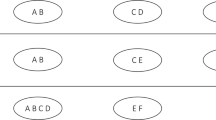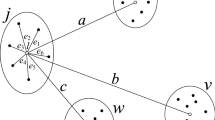Abstract
We present a method for finding clustering structures which are good and trustable. The method analyzes re-clustering results obtained by varying the search path in the space of partitions. From the scatter of results the joint optimum of given quality criteria is determined and the re-occurrence probability of this optimum (called optimum consensus) is estimated. Then the finest structure is determined that emerged robustly with scores typical of high partition quality. When applied to tumor gene expression benchmark data the method assigned fewer tissue samples to a wrong class compared to methods based on either consensus or quality criteria.
Access this chapter
Tax calculation will be finalised at checkout
Purchases are for personal use only
Preview
Unable to display preview. Download preview PDF.
Similar content being viewed by others
References
MÖLLER, U. (2005): Estimating the Number of Clusters from Distributional Results of Partitioning a Given Data Set. In: B. Ribeiro, R.F. Albrecht, A. Dobnikar, D.W. Pearson and N.C. Steele (Eds.): Adaptive and Natural Computing Algorithms. Springer, Wien, 151–154.
MONTI, S., TAMAYO, P., MESIROV, J., and GOLUB, T. (2003): Consensus Clustering: a Resampling-Based Method for Class Discovery and Visualization of Gene Expression Microarray Data. Machine Learning, 52, 91–118.
SWIFT, S., TUCKER, A., VINCIOTTI, V., MARTIN, N., ORENGO, C., LIU, X., and KELLAM, P. (2004): Consensus Clustering and Functional Interpretation of Gene-Expression Data. Genome Biology, 5, R94.
THEODORIDIS, S. and KOUTROUMBAS, K. (1999): Pattern Recognition. Academic Press, San Diego.
Author information
Authors and Affiliations
Editor information
Editors and Affiliations
Rights and permissions
Copyright information
© 2006 Springer Berlin · Heidelberg
About this paper
Cite this paper
Möller, U., Radke, D. (2006). Assessing the Trustworthiness of Clustering Solutions Obtained by a Function Optimization Scheme. In: Spiliopoulou, M., Kruse, R., Borgelt, C., Nürnberger, A., Gaul, W. (eds) From Data and Information Analysis to Knowledge Engineering. Studies in Classification, Data Analysis, and Knowledge Organization. Springer, Berlin, Heidelberg. https://doi.org/10.1007/3-540-31314-1_85
Download citation
DOI: https://doi.org/10.1007/3-540-31314-1_85
Publisher Name: Springer, Berlin, Heidelberg
Print ISBN: 978-3-540-31313-7
Online ISBN: 978-3-540-31314-4
eBook Packages: Mathematics and StatisticsMathematics and Statistics (R0)




